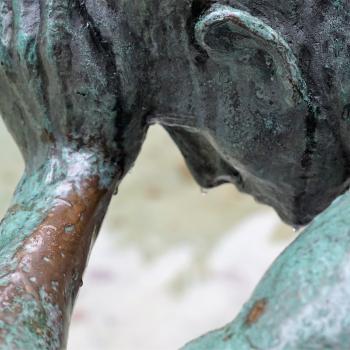 If I were less ordinary, reading Flannery O’Connor would be more fun. As it is, I inhabit the commonplace, and she lives in a different dimension, a place, as one critic put it, of living gargoyles. This makes reading her fiction a stressful and shocking experience. I imagine that, if she knew this, it would please her very much.
If I were less ordinary, reading Flannery O’Connor would be more fun. As it is, I inhabit the commonplace, and she lives in a different dimension, a place, as one critic put it, of living gargoyles. This makes reading her fiction a stressful and shocking experience. I imagine that, if she knew this, it would please her very much.
Flannery O’Connor, one of America’s unique literary voices in the twentieth century, did not aim to soothe, or entertain, or please, or delight. Writing only to awaken a sleepy audience, she didn’t make much effort to be nice about it. No soothing chime—rather a clanging bell right in your ear.
She once put it this way: “The novelist with Christian concerns will find in modern life distortions which are repugnant to him, and his problem will be to make these appear as distortions to an audience which is used to seeing them as natural; and he may well be forced to take ever more violent means to get his vision across to this hostile audience.” Her word for this is “grotesque.” Yes. That word works.
So, I’ve been reading her short story, “Revelation.” Of all her works that I’ve read, this is my favorite.
It is filled with grotesque characters: an icky little boy with a snotty nose; an ugly, acne-infested, fat girl; a trashy, filthy, snuff-snorting woman; a relentlessly pleasant, but vacuous, woman; and Mrs. Turpin, the Queen of the Grotesque, whose pristine sense of virtue is yoked to her judicious tastes about shoes, people, behavior, blacks, trashy whites, and, above all, worthiness.
This business of worthiness is what occupies my thoughts. Mrs. Turpin is like a two-way mirror. You think you’re looking out when someone is really looking in. We read “Revelation,” and we think, oh, she is truly nasty—a vile, pharisaic, priggish sort of Christian who is certainly nothing like me or anyone with whom I associate. But I know people like that, oh yes I do. And I read about them, and sometimes I vilify them. And I’m ever-so-glad I’m not like her. And she’s just the sort of Christian that makes it bad for all of us; she’s the kind that ends up being interviewed on some talk show, embarrassing all sincere followers of Jesus everywhere.
She’s the Christian who gets shown on media clips after some horrific natural disaster saying something really boneheaded about past sin. She’s the Christian who rather ingloriously defends traditional marriage in vulgar terms. She’s the Christian who makes really dumb remarks about abortion, rape, and, well, all women in general. She’s the Christian who clings to 1950s institutions and values. She’s the Christian whose politics are smeared all over her faith. She’s the Christian who defends outdated laws because “the Bible said so.” She’s the Christian who preaches honor and virtue and then sneaks away for the weekend with her lover. She’s the Christian who offers blessed handkerchiefs in the mail for a donation.
Ugh. All of them. Grotesque. So glad I’m not like them.
I, like so many lately, sometimes want to say this: “They call themselves Christians. I am not like them. (Really.) I’m not that kind of a Christian. Therefore I will not use that label. I am really crazy about Jesus, but, no, I am not a Christian. Because ‘they’ are Christians. ‘They’ are too grotesque for me to acknowledge as my own. ‘They’ are horrid people who say and do horrid things, and, after all, if I accept the name ‘Christian’ people will think that I think that those horrid things are okay, or maybe they’ll even think I am like that. And believe me, I’m on your side—those horrid things they say and do are truly horrid. So here, let me squeeze over on your side of virtue, and together we will shudder in horror at their nastiness. And then maybe you’ll see that my Jesus is nothing like their Jesus. And you’ll like him more.”
Do we really think that by abandoning a label, and thus ridding ourselves of the “baggage” of believers-whose-sanctification-has-not-yet-reached-an-acceptable-level, we can purify ourselves or our faith? Are we trying to say “we’re the genuine article and they’re all fakes and frauds”?
Clearly, not all that calls itself “Christian” is. I’m not arguing that we should call what is not good, good; or that we should overlook evil; or that the Christian “brand” automatically makes something acceptable. Mrs. Turpin is genuinely repulsive. The words and actions of many who call themselves followers of Christ make me weep with the pain they cause and the ignorance they display. But the compulsive need to wash my hands of their ickiness, even when done in the most “authentic, true-self” way is merely a posturing that will accomplish absolutely nothing. And frankly, some day someone will inevitably want to wash their hands of my ickiness. We who follow Jesus may work hard to disassociate ourselves from labels that have been dragged through the muck, but most certainly any new labels we devise, we will eventually foul. We are still working out our salvation.
I’d like you to read “Revelation,” mainly because the end is so glorious. But Flannery O’Connor’s brilliance is in peeling back Mrs. Turpin’s bigotry and hypocrisy and pride, and revealing, underneath, one who still receives grace and is to be loved. There, at the end, she is caught up in the “vast horde of souls rumbling toward heaven…even [as] their virtues were being burned away.” She is shocked at the revelation, and we, too, as we read it are shocked at her inclusion, at her role as the recipient of grace. What?? The grotesque get in too?
So, yes, I’m a Christian. A thorny label. One that is bound to smear me with undesirable, and at times even monstrous associations. So be it. If I don’t love Mrs. Turpin, if I prefer to stand in judgment and thereby protect my Jesus-virtue, I might not get caught up in that great final sweep of mercy.












